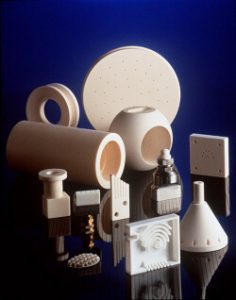 Why advanced ceramics isn’t what you think it is
Why advanced ceramics isn’t what you think it is
August 28, 2014 REDWIRE is news you can use from leading suppliers. Powered by FRASERS.
Posted by Astro Met Inc
Astro Met, Inc. provides solutions to demanding wear, corrosion, thermal and electrical applications through the enginee... Read more
Subscribe
Free REDWIRE e-newsletter

From the floor tiles people walk on, to ceramic knives top chefs cut food, to the biomedical implants surgeons transplant, advanced ceramics applications run the gamut of commonplace to specialized.
Whether you’ve taken an art class or know someone who has, you may be familiar with the fine art of ceramics. Conventional ceramics or pottery is about sculpting clay or mud, which is baked at high temperatures, cooled, then later displayed as ceramic tableware or atop a shelf as a clay pot.
While understandable to believe advanced ceramics sounds like a progressive course on ceramic basics 101, the term is not an academic discipline, but rather an industrial manufacturing process.
Advanced ceramics is a technologically innovative method to develop ceramic products using materials and substances with distinctively exceptional chemical and physical properties.
Thanks to developments in material sciences, advanced ceramics now play in the big leagues alongside metal: products manufactured using advanced ceramic processes either match or surpass the electrical conductivity, tensile strength, thermal stability and corrosion resistance of its metallic equal.
Get to speed on two common ceramic substances used in the manufacturing of industrial applications.
Aluminum oxide is the epitome of how pressure makes diamonds
Aluminum oxide ceramic material is a widely used, low cost and high strength workhorse designed for applications needing low thermal expansion and stability while under elevated temperatures (we're talking up to 1,500°C or 2,732°F).
Shielded with anti-corrosion and low friction properties, Aluminum oxide is a high-density, fine grain structure material with a hard, diamond-like exterior.
Possessing both mechanical and dielectric strength, aluminum oxide is a prime choice in the automotive or electrical sectors for precision components, such as pump bearings or for protective sleeves and tubes.
Astro Met’s own aluminum oxide ceramic, for example, AmAlOx 68 Alumina (Astro Met Aluminum Oxide) is a high purity 99.8 % aluminum oxide ceramic specifically engineered as a cost-effective, uniquely structured substance. AmAlOx 68 is optimized for abrasion intensive applications, including a high stiffness to weight ratio and sound biocompatibility.
Zirconium oxide applications so good, you can seek your teeth into them – seriously
The crystalline, inorganic oxide withstands cracking under pressure because of its fracture-proof properties. Zirconium oxide also boasts amazing tensile strength, excellent biocompatibility and impressively handles high temperatures without breaking a sweat.
Because of the superior wear and tear resistance and well-known translucent appearance, zirconium oxide is also a dentist’s best friend for creating crowns, bridges and other dental ceramics.
Our own special mix of zirconium oxide, AmZirOx 86 Zirconia Ceramic (Astro Met Zirconium Oxide) offers stabilized zirconia based ceramic materials speficially formulated for applications requiring superior durability, toughness and abrasion impact, such as oxygen sensors for the automotive industry.
Since you’ve already scratched the surface on advanced ceramics, why not go deeper by learning more at astromet.com to sample our wide range of ceramic materials, features and benefits.
Share
Posted by Astro Met Inc
Astro Met, Inc. provides solutions to demanding wear, corrosion, thermal and electrical applications through the enginee... Read more
